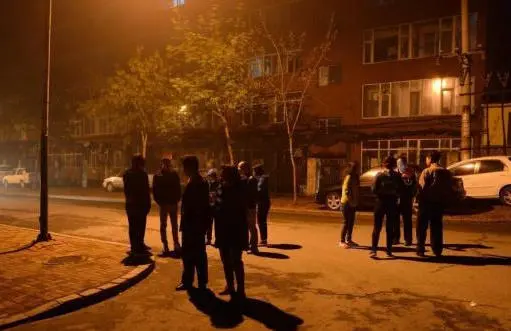“Freedom of speech? Yes. But there is no absolute freedom of speech,” Xu Qinduo, a current affairs commentator said.
His comments come following the first friendly match between the Chinese Under-20s soccer team and a fourth-tier German club was delayed after a group of spectators displayed Tibetan flags inside the stadium.
The Chinese players walked off the field in Mainz in protest and refused to continue playing for 25 minutes until the banners were withdrawn.
Reinhard Grindel, president of the German Football Association, defended the fans' right to peaceful protest, citing the principal of freedom of speech.
“We in Germany deeply believe that freedom of speech is part of our way of living. To show symbols, even if they are political, it’s OK as long as they are not forbidden,” Christian Gottschalk, a political analyst who writes for the German newspaper Stuttgarter Zeitung explained.
“Here, the (Tibetan) flag is not forbidden. You can wave it,” he said.
However, Xu countered that freedom of speech could not be used as an excuse in this case, saying the concept has boundaries.
“If you live in Germany, if you support the Nazi regime, if you are a Holocaust denier, if you praise Adolf Hitler, you are likely to end up in detention. But you can do so probably in the US, in Canada. No problem. Whether it is a problem or not depends on whether people feel offended,” he argued.
Xu said he could understand why the Chinese players reacted in the way they did.
“They care a lot about the unification of their nation. Remember, 150 years ago, China was invaded by the Eight Powers. They don’t like to be lectured about freedom of speech or human rights and also they don’t like to see foreign intervention into their internal affairs.”
Xu thought that in their eyes waving Tibetan flags inside the stadium during a match was imposing politics on them, pointing out that there should be “a separation between politics and sports. That’s the FIFA rule.”
FIFA, soccer’s international governing body, does have rules in place banning political slogans and protests at football matches.
Soccer meets politics as Chinese players in Germany give protesters the red card
POLITICS CGTN 7823km to Beijing
2017-11-27 11:22 GMT+8
Share
By CGTN's The Point
“Freedom of speech? Yes. But there is no absolute freedom of speech,” Xu Qinduo, a current affairs commentator told CGTN’s The Point.
His comments come following the first friendly match between the Chinese Under-20s soccer team and a fourth-tier German club was delayed after a group of spectators displayed Tibetan flags inside the stadium.
The Chinese players walked off the field in Mainz in protest and refused to continue playing for 25 minutes until the banners were withdrawn.
Reinhard Grindel, president of the German Football Association, defended the fans' right to peaceful protest, citing the principal of freedom of speech.
Christian Gottschalk, a political analyst at the Stuttgarter Zeitung. /CGTN Screenshot
“We in Germany deeply believe that freedom of speech is part of our way of living. To show symbols, even if they are political, it’s OK as long as they are not forbidden,” Christian Gottschalk, a political analyst who writes for the German newspaper Stuttgarter Zeitung explained.
“Here, the (Tibetan) flag is not forbidden. You can wave it,” he said.
However, Xu countered that freedom of speech could not be used as an excuse in this case, saying the concept has boundaries.
“If you live in Germany, if you support the Nazi regime, if you are a Holocaust denier, if you praise Adolf Hitler, you are likely to end up in detention. But you can do so probably in the US, in Canada. No problem. Whether it is a problem or not depends on whether people feel offended,” he argued.
Xu said he could understand why the Chinese players reacted in the way they did.
“They care a lot about the unification of their nation. Remember, 150 years ago, China was invaded by the Eight Powers. They don’t like to be lectured about freedom of speech or human rights and also they don’t like to see foreign intervention into their internal affairs.”
Xu thought that in their eyes waving Tibetan flags inside the stadium during a match was imposing politics on them, pointing out that there should be “a separation between politics and sports. That’s the FIFA rule.”
FIFA, soccer’s international governing body, does have rules in place banning political slogans and protests at football matches.
“You can’t stop protesters on the street, but you can say we do not want to have this kind of political protest inside the stadium,” Christian Gottschalk said, adding that the owners of the stadiums and the German Football Association have to fix the rules if this is how they want the situation to be.
Though he was not sure what the solution could be to cases like this, he believed there is the possibility to make compromises.
The Point with Liu Xin is a 30-minute current affairs program on CGTN. It airs weekdays at 9.30 p.m. BJT (1330GMT), with rebroadcasts at 5.30 a.m. (2130GMT) and 10.30 a.m. (0230GMT).
(CGTN)
 简体中文
简体中文

